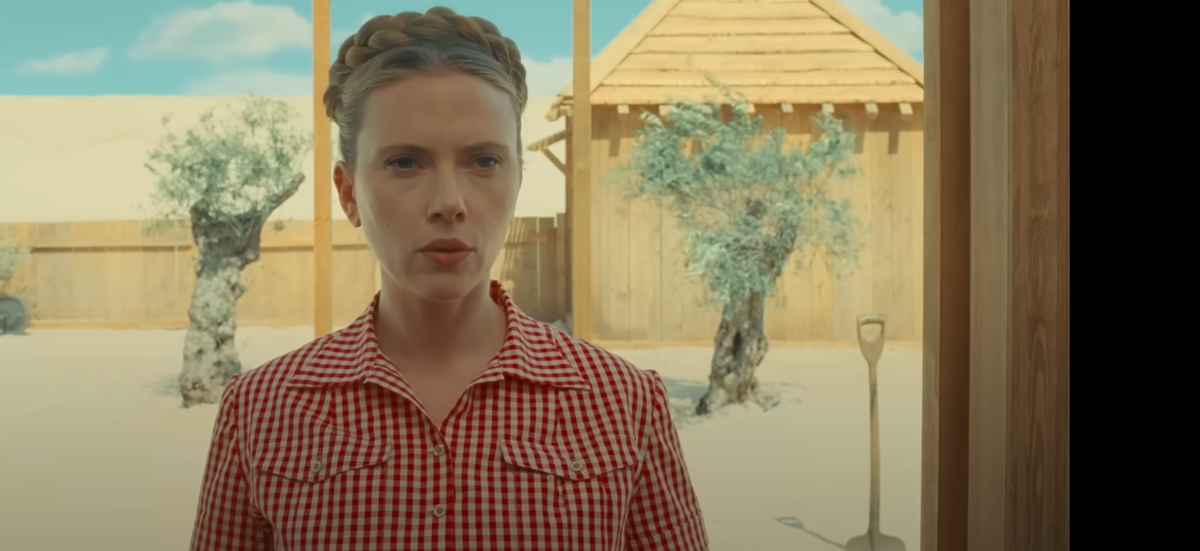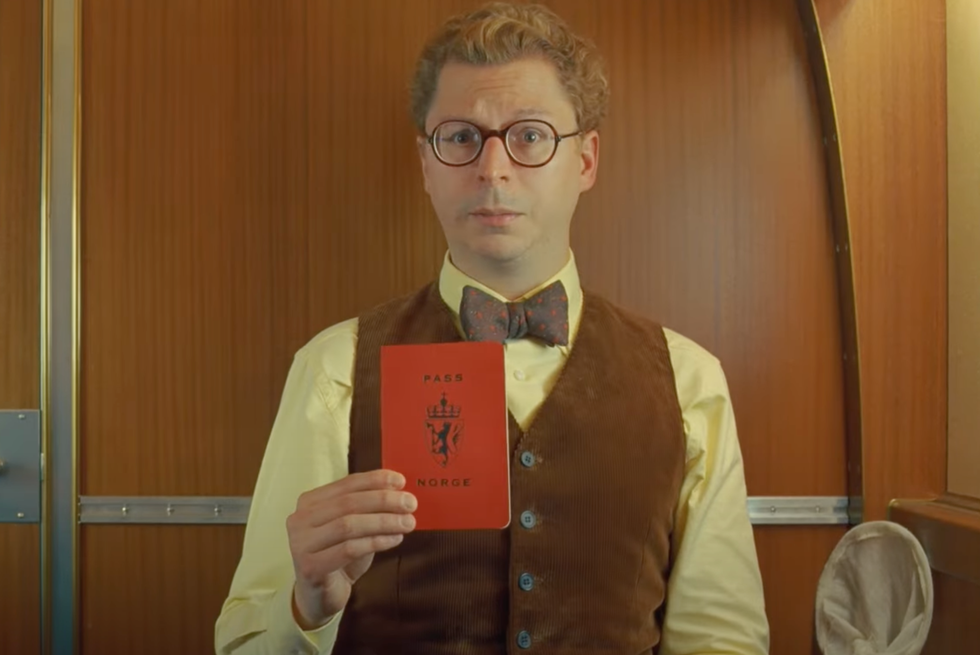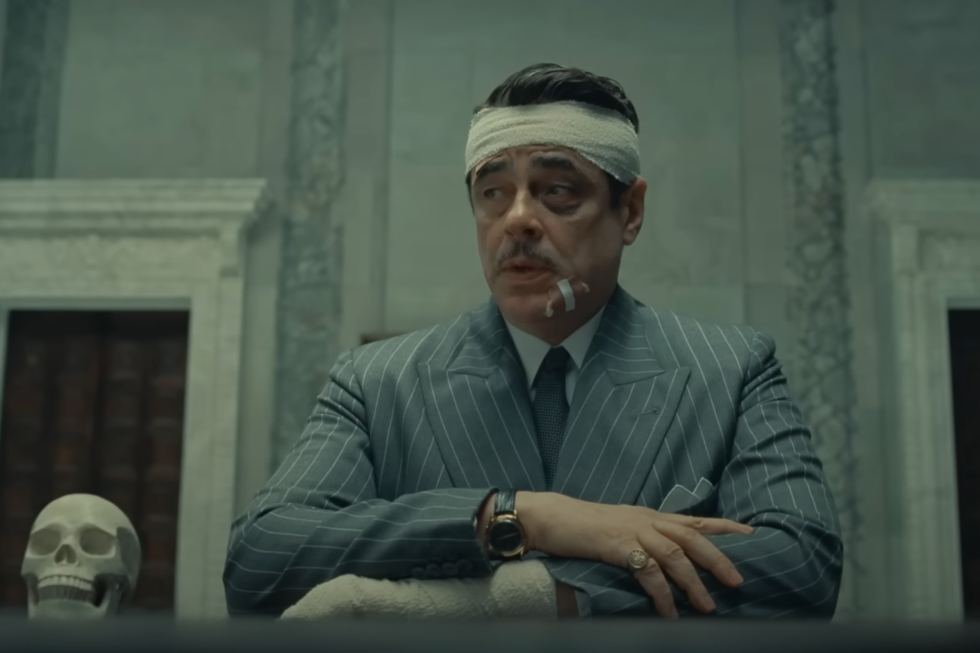The Hidden Darkness In Wes Anderson's <em>The Phoenician Scheme</em>


When Wes Anderson was doing press for The Fantastic Mr. Fox in 2009, he expressed dismay that the film wound up so identifiably his. “My approach was to try to make it like Roald Dahl,” Anderson told The Treatment’s Elvis Mitchell. “I was always thinking, How would Roald Dahl have done it? And in the end, as much as I tried to do that, it appears that I’ve done it the way I would’ve done it anyway.”
Sixteen years and six features later, Anderson seems to have come to peace with his inability to do things any way other than the way he does them. Somehow, each successive film inches a fraction closer to the Andersonian ideal—symmetrical, ornate, clever, complex.
So yes, rest assured that his newest film, The Phoenician Scheme—in select theaters May 30 and releasing wide June 6—features nearly all of the Anderson hallmarks. There are dazzling sets, intricate plots, a fragile family, and, most notably, an irresponsible and irrepressible patriarch. This one is Zsa-zsa Korda, a wealthy international businessman, who specializes in “armaments, aviation, infrastructure, and the negotiation of clandestine trade agreements.”
Where Quentin Tarantino has become fond of rewriting the past, Wes Anderson wants to perpetually exist in the most romantic version of it. So while Zsa-zsa—played by Benicio Del Toro with a deadpan brio that’s closer to M. Gustave than Herman Blume—is a shifty dealer, he also has impeccable taste, a galvanizing spirit, a love of nature, and a lot of wise (and unwise) lessons to impart on his nine rambunctious sons. If only today’s law-breaking one-percenters were this imaginative and charismatic.

Michael Cera gets an outsized portion of the movie’s laughs, thanks to an imperfect accent and some utterly perfect line readings.
When we first meet Zsa-zsa, he is flying in his private plane, a propulsive score signaling that there may be some danger ahead. He hears a strange sound, turns around, and a fuselage panel blows off the plane, taking the upper half of his secretary with it. Zsa-zsa proceeds to figuratively fire—and then literally eject—the pilot, and he miraculously survives a crash landing in a cornfield in the Balkan flatlands.
From Royal Tennembaum to Augie Steenbeck, Anderson’s aging paterfamilias have frequently contended with mortality. But none have stared death in the face quite like Zsa-Zsa in this new film. After the plane crash, Zsa-zsa experiences one of what will be several visions from beyond the grave. These scenes are shot in black and white and find Anderson doing his best Bunuel—surreal, religious, with Zsa-zsa sitting in judgement. Of course, this being an Anderson film, the holy figures are played by some heavy hitters whose presence makes these moments feel more cheeky than trippy or sacred.
Still, they serve their purpose. Shaken by his brush with death—and anticipating future assassination attempts—Zsa-zsa reconnects with his daughter, Liesl (Mia Threapleton, in what’s sure to be one of the year’s great breakout performances). Liesl is a nun-in-training, and she has lived in a convent ever since her mother died when she was young.
Zsa-zsa has brought Liesl to his estate with an eye towards naming her his heir. But first, he enlists her in his grandest plan yet: “The Korda Land and Sea Phoenician Infrastructure Scheme.” The scheme is outlined in a series of shoeboxes, and what it actually entails is less important than what it requires. Zsa-zsa needs to close a gap in the plan’s financing, which means visiting various key players.
After some cajoling, Liesl joins Zsa-zsa in his journey—as does the family’s new Norwegian tutor and entomologist, Bjorn, played by fellow Wesworld newcomer Michael Cera. Cera gets an outsized portion of the movie’s laughs, thanks to an imperfect accent and some utterly perfect line readings (“I speak my heart, I’m a bohemian” is one line I will be quoting too much in the near future). But Tom Hanks and Bryan Cranston, who play mustachioed West Coast businessman brothers, give Cera a run for his money in the Having-Fun department. They represent one of the first stops in Zsa-zsa’s scheme, and their meeting devolves into a comically lopsided game of horse. It’s probably my favorite scene of the movie.
Which is not to say there aren’t many other highlights. A meeting with French nightclub owner, Marseille Bob (Mathieu Amalric), descends into mayhem when it’s interrupted by a group of careless armed revolutionaries; there is an absurd bout with quicksand; in the third act, we get a superb slapstick melee between Zsa-zsa and his big-bearded brother, Uncle Nubar (a brilliant Benedict Cumberbatch). Overall, the film offers constant reminders why the greatest actors in the world will show up for Anderson no matter the size of the role. Within all his strictures—the precise blocking, the unchangeable dialogue—there’s room to play, and nearly everyone shines.

Benicio Del Toro plays Zsa-zsa Korda with a deadpan brio that’s closer to M. Gustave than Herman Blume.
Anderson’s films often take multiple viewings to fully appreciate, probably because there’s so much going on—between the fullness of the frame, all the throwaway gags, the witty asides, and the historical and cinematic references. I suspect that will be true of The Phoenician Scheme, as well. On first viewing, all the hijinks could obscure the film’s central tension—why do men like Zsa-zsa do what they do? And do they have any chance at redemption?
At one point, Liesl poses a version of that first question to Zsa-zsa directly, and he alludes to his childhood. But Anderson’s real theory regarding what motivates powerful renegade men comes later, when Zsa-zsa squares off against Uncle Nubar. The two of them admit that it all comes down to winning, or in Nubar’s words: “Who can lick who—or whom, I guess.”
As for the second question, I won’t spoil the movie too much, except to say that Anderson’s conclusion projects a level of hope. Which is ironic, in a way—Anderson, our most consistent auteur, wanting to believe that a man like Zsa-zsa can change. But then, for all we know Wes hasn’t had any brushes with death. Maybe his movies would look different if he was judged by a power greater than critics. Then again, in the estimation of this critic, why mess with a good thing?
esquire





